Choose your Bitcoin wallet
Find your wallet and start making payments with merchants and users.
Take time to educate yourself
Bitcoin is different from what you know and use every day. Before you start using Bitcoin for any serious transaction, be sure to read what you need to know and take appropriate steps to secure your wallet. Always remember that it is your responsibility to choose your wallet carefully and adopt good practices in order to protect your money.
Which is the Best Bitcoin Wallet?
This guide will help you to find the best Bitcoin wallet for YOU!
There's no "one size fits all" Bitcoin wallet. Wallets come on different platforms with different features.
If you want the best possible wallet, keep reading.
Select Your Preferences
Wallet Finder
Just enter your wallet preferences and we'll show you the best wallet for your needs.
Recommendations
 Ledger Nano S Buy Learn More
Ledger Nano S Buy Learn More
The Ledger Nano S is the cheapest hardware wallet. Hardware wallets secure your coins by storing them offline and away from hackers. The Ledger Nano S supports more coins than any other hardware wallet, like bitcoin, litecoin, ether and more. It can be used with any desktop computer or Android device.
 TREZOR Buy Learn More
TREZOR Buy Learn More
TREZOR launched in August 2014 as the first Bitcoin hardware wallet, offering secure bitcoin storage plus the ability to spend with the convenience of a hot wallet. TREZOR is a small, thumb-sized device.
 Samourai Wallet
Samourai Wallet
Samourai is 100% the best available Android wallet. It has the most features, the best privacy and its developers are constantly working to add the latest Bitcoin features to the wallet. Samourai Wallet has been around for more than 3 years and its code is fully open source.
 Coinomi
Coinomi
Coinomi is the most popular multi-coin cryptocurrency wallet for iOS and Android. It supports over 100+ coins including bitcoin, litecoin, ether, dash and more.
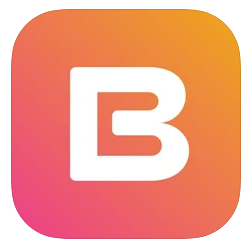 BRD
BRD
BRD is a mobile wallet for both Android and iOS. Its clean interface makes it easy to use for beginners. It supports bitcoin and ether.
 Electrum
Electrum
Electrum wallet is an easy to use desktop wallet for Mac, Windows and Linux. It's east and fast to setup so you can start sending and receiving bitcoins right away.
 Exodus
Exodus
Exodus is the most popular multi-coin cryptocurrency wallet. It supports Bitcoin, ether, litecoin, dash, Golem and many more.
What is a Bitcoin Wallet?
A Bitcoin wallet is the first step to using Bitcoin.
A “wallet” is basically the Bitcoin equivalent of a bank account. It allows you to receive bitcoins, store them, and then send them to others.
You can think of a wallet as your personal interface to the Bitcoin network, similar to how your online bank account is an interface to the regular monetary system.
Bitcoin wallets contain private keys; secret codes that allow you to spend your bitcoins.
In reality, it’s not bitcoins that need to be stored and secured, but the private keys that give you access to them.
A Bitcoin wallet is simply an app, website, or device that manages Bitcoin private keys for you.
This guide will show you how to create a bitcoin wallet and pick the best one.
Types of Bitcoin Wallets
Let's discuss the types of bitcoin wallets and why you might want to use one kind over another.
Hardware Wallets
A hardware wallet is a physical electronic device, built for the sole purpose of securing bitcoins.
The core innovation is that the hardware wallet must be connected to your computer, phone, or tablet before bitcoins may be spent.
The three most popular and best Bitcoin hardware wallets are:
Hardware wallets are a good choice if you’re serious about security and convenient, reliable Bitcoin storage.
Bitcoin hardware wallets keep private keys separate from vulnerable, internet-connected devices.
Your all-important private keys are maintained in a secure offline environment on the hardware wallet, fully protected even should the device be plugged into a malware-infected computer.
As bitcoins are digital, cyber-criminals could, potentially, target your computer’s “software wallet” and steal them by accessing your private key.
Generating and storing private keys offline using a hardware wallet ensures that hackers have no way to reach your bitcoins.
Hackers would have to steal the hardware wallet itself, but even then, it can be protected with a PIN code.
Don’t worry about your hardware wallet getting stolen, lost or damaged either; so long as you create a secret backup code, you can always retrieve your bitcoins.
Think of a hardware wallet like your own underground steel vault. If you own a significant amount of bitcoin, you should strongly consider getting one!
Why are hardware wallets good?
- Easiest way to securely store bitcoins
- Easy to backup and secure
- Less margin for error; setup is easy even for less technical users
Why are hardware wallets bad?
- They're not free!
Hot Wallets
Hot wallets are Bitcoin wallets that run on internet connected devices like a computer, mobile phone, or tablet.
Private keys are secret codes. Because hot wallets generate your private keys on an internet connected device, these private keys can’t be considered 100% secure.
Think of a hot wallet like your wallet today: you use it to store some cash, but not your life savings. Hot wallets are great if you make frequent payments, but not a good choice for the secure storage of bitcoins.
Why are hot wallets good?
- Easiest way to store small amounts of bitcoin
- Convenient; spending and receiving payments is easy and fast
- Some hot wallets allow access to funds across multiple devices
Why are hot wallets bad?
- Not safe for the secure storage of large amounts of bitcoins
Which Wallet is Best for You?
Investing or saving? Then a hardware wallet will keep your coins safe.
Otherwise, a software wallet will send and receive bitcoins just fine. Best of all, software wallets are free.
Each wallet has pros and cons, and different wallets are built to solve different problems.
Here is a video that may help:
Some wallets may be geared towards security, while some wallets may be more focused on privacy.
Your specific needs should determine the wallet you use, as there is no “best bitcoin wallet”.
Below, we've listed wallets you can buy or download. We suggest using the wallets listed or doing research before buying or downloading any wallet.
Each day, new Bitcoin scam wallets are added to the Google Play Store and Apple app store that are designed to steal peoples' bitcoins.
We only list wallets that have published and open-sourced their code.
Hardware Wallets: Keep Your Coins Safe
Hardware wallets aren't free.
But the price can be worth it if you own a significant amount of bitcoins. A hardware wallet will protect a few hundred in Bitcoin just as effectively as a few million.
How Hardware Wallets Work
Hardware wallets are secure, offline devices. They store your private keys offline so they can't be hacked.
This means you can even use one on a malware infected computer.
Why A Hardware Wallet with a Screen is Important
In the table below, you'll notice we show which hardware wallets have screens.
Screens provide extra security by verifying and displaying important wallet details. Since the hardware wallet is nearly impossible to hack, its screen is more trustworthy than data displayed on your computer.
Bitcoin Hardware Wallet Comparison
Check the table below for a quick comparison. Note:


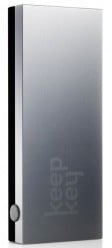
Best Bitcoin Hardware Wallet Overviews
 Ledger Nano S Buy Learn More
Ledger Nano S Buy Learn More
The Ledger Nano S is the cheapest of the three hardware wallets with a screen; it costs about $95. Ledger, one of the most well-known Bitcoin security companies, released the device in August 2016.
 TREZOR Buy Learn More
TREZOR Buy Learn More
TREZOR launched in August 2014 as the first Bitcoin hardware wallet, offering secure bitcoin storage plus the ability to spend with the convenience of a hot wallet. TREZOR is a small, thumb-sized device.
 KeepKey Buy Learn More
KeepKey Buy Learn More
KeepKey was released in September 2015 and was the second hardware Bitcoin wallet to offer a screen. The KeepKey's larger screen gives it some extra security features that the Nano S and Trezor lack.
Hot Wallets
Just a quick refresher:
Hot wallets are Bitcoin wallets that run on internet connected devices like a computer, mobile phone, or tablet. As hot wallets generate private keys on an internet connected device, these private keys can’t be considered 100% secure.
Think of a hot wallet like your wallet today: you use it to store some cash, but not your life savings. Hot wallets are great if you make frequent payments, but not a good choice for the secure storage of bitcoins.
Online Bitcoin Wallets (Web Wallets)
Web wallets store your private keys online, where they are encrypted with a user-selected password. Although they offer the lowest level of security, online bitcoin wallets have the advantage of being accessible from any internet connected device.
 GreenAddress
GreenAddress
GreenAddress is a multi-signature Bitcoin wallet available on the web, desktop, Android, and iOS. GreenAddress is compatible with hardware wallets like TREZOR, Ledger Nano, and the HW.1.
“Multi-signature” in this context means that the site requires a manual confirmation from you for your coins to be moved; this greatly improves security.
Android Bitcoin Wallets
There is a large selection of Android wallets. Since Bitcoin wallets were originally banned by Apple, developers spent much of their time developing for Android.
 Samourai Wallet
Samourai Wallet
Samourai is 100% the best available Android wallet. It has the most features, the best privacy and its developers are constantly working to add the latest Bitcoin features to the wallet. Samourai Wallet has been around for more than 3 years and its code is fully open source.
 Mycelium
Mycelium
Mycelium is the most popular Bitcoin wallet on Android. It's very easy to use for sending and receiving payments. Backing up your wallet is also simple, since Mycelium makes it very clear with setup and backup instructions.
 breadwallet
breadwallet
breadwallet, the great iPhone Bitcoin wallet, recently released an Android wallet. It offers the user control of private keys, an easy to use interface, and passcode support.
 Edge
Edge
Edge is an easy to use Bitcoin wallet for iPhone and Android. Its familiar login feature makes using the app a breeze for people new to bitcoin. The wallet also creates automatic backups, so you don't have to worry about the technicalities of performing manual wallet backups.
 GreenBits
GreenBits
GreenBits is the native Android version of GreenAddress. It’s a multi-signature wallet that also supports hardware wallets like TREZOR and Ledger.
 Bitcoin Wallet
Bitcoin Wallet
Bitcoin Wallet, or “Schildbach Wallet”, was the first mobile Bitcoin wallet. Bitcoin Wallet is more secure than most mobile Bitcoin wallets, because it connects directly to the Bitcoin network. Bitcoin Wallet has a simple interface and just the right amount of features, making it a great wallet and a great educational tool for Bitcoin beginners.
iOS and iPhone Bitcoin Wallets
Apple banned Bitcoin wallets from the App Store in February 2014, but reversed its decision a few months later. Luckily, there are now plenty of options for iOS users.
 breadwallet
breadwallet
We consider breadwallet, along with Copay (below), as the best bitcoin wallet for iPhone. It’s open source and gives the user full control over their private keys. It also has a clean interface which makes the sending and receiving of bitcoins a pleasurable and super-simple process.
 Edge
Edge
Edge is an easy to use Bitcoin wallet for iPhone and Android. Its familiar login feature makes using the app a breeze for people new to bitcoin. The wallet also creates automatic backups, so you don't have to worry about the technicalities of performing manual wallet backups.
Desktop Wallets
Desktop wallets are downloaded and installed on your computer. If privacy is your main concern, the Bitcoin core wallet is a good option since it does not rely on third parties for data.
 Electrum
Electrum
Electrum is a light weight Bitcoin wallet for Mac, Linux, and Windows. Electrum was created in November 2011. The main features of Electrum are: support for hardware wallets (such as TREZOR, Ledger Nano and KeepKey), and secure Bitcoin storage using an offline computer. Electrum is a good option for both beginners and advanced users.
Bitcoin Banks: $1 Billion Lost in Hacks
One last thing to keep in mind when it comes to bitcoin wallets is that there is a difference between a wallet and a bank. Some Bitcoin users view Coinbase as a Bitcoin wallet, but companies like this operate much more like banks.
The private keys are what users need to protect to safely use the Bitcoin network without getting robbed. When you hand someone else control over your private keys, you are essentially making a deposit at that financial institution – much like a deposit at any bank.
Don't store coins on exchanges! Bitcoin users have lost over $1 billion worth of bitcoins in exchange hacks and scams. Control your own private keys.
This is not to say that bitcoin banks are inherently bad. Companies like Coinbase have done wonders for bringing more users into the ecosystem. It is simply important to remember that whoever controls the private keys controls the bitcoin attached to those keys.
A misunderstanding of this point has led to hundreds of millions of US dollars being lost in the past, so it’s important to understand this critical difference in how Bitcoin private keys can be stored.
Understanding how bitcoin wallets work is an important aspect of safely using this new technology. Bitcoin is still in its early years of development and wallets will become much more user-friendly in time.
In the near future, certain devices may eventually come with pre-installed wallets that interact with the blockchain without the user’s knowledge.
For now, it’s vital to keep in mind that the private keys are what you need to protect if you want to keep your bitcoin safe from hackers, user error, and other possible issues.
Theft and Scams
No matter which wallet you choose, remember:
Your bitcoins are only safe if the private key was generated securely, remains a secret, and--most importantly--is controlled only by YOU!
Here are two examples where users got ripped off by leaving bitcoins in the care of a third party:
To avoid theft, scams, and any other loss of funds, follow these three basic principles:
- Generate your private keys in a secure, offline environment. (Except if using trivial amounts, in which cases keys may be created in a hot wallet).
- Create backups of your private keys. This helps to protect against the loss of your bitcoins due to hard drive failure or some other problem or accident. Ideally you should have a duplicate set of backups kept off-site to protect against the possibility of fire, robbery, etc.
- Encrypt wallets to provide additional security. This helps prevent the physical theft of your funds in the event that your device or hardware wallet is stolen.
Securing your bitcoins properly is the most important step for any Bitcoin user.
With Bitcoin you have the privilege - but also the responsibility - to safeguard your own money. There have been countless scams related to Bitcoin that could have been prevented had people not entrusted others with their bitcoins.
It’s a good rule of thumb to never trust anyone else with your money.
Bonus Chapter
Bitcoin Wallet Frequently Asked Questions
Bitcoin wallets. What are they?
Bitcoin Wallets let us send, receive and store Bitcoin amounts all the way down to the Satoshi unit.
Wallets secure funds by guarding our private keys. These private keys act as the proof of ownership for our Bitcoins. As such, a Bitcoin wallet is like a key to your safe deposit box on the Blockchain.
What is a private key?
Private keys emerged as a way to communicate securely through insecure communication channels.
Historically, before the advent of public key cryptography, the greatest cryptographic weakness was the inability to communicate the ‘key’ that makes sense of encrypted messages. As a solution, the use of two keys (public and private) entered the picture.
It’s a nifty little trick.
Keys come in pairs. The public key is used to encrypt the message whereas the private key decrypts the message. The only person with the private key is you. Everyone else is free to have your public key. As a result, everyone can send you encrypted messages without having to agree on a key beforehand. They simply use your public key and you untangle the gibberish by using your private key.
Why should I care about private keys?
At the end of the day, all of this can go over your head without much danger. Just remember that it’s good to know what you’re dealing with. Bitcoin wallets make use of a fundamental cryptographic principle that we use for things ranging from https for websites or sending anonymous tips to Wikileaks. Most importantly, by understanding private keys you’ll have a much easier familiarizing yourself with Cold Storage wallets.
What is a Bitcoin address?
A Bitcoin address is like an account number, just better. The address denotes which wallet the coins should be sent to. Like a bank account number, where the difference lies in the wallets having multiple addresses. These can be customized by including payment request information such as an amount and a date of expiration.
What should I know about addresses?
Bitcoin wallet addresses are case sensitive, usually have 34 characters of numbers and lowercase letters, start with either a 1 or a 3, and never use 0, O, l and I to make every character in the address as clear as possible. That’s a lot to take in. But don’t worry. What they consist of is largely irrelevant to you. Just know they’re a string of characters that denote a destination on the Bitcoin Blockchain.
How do I generate a Bitcoin address for my wallet?
How to generate a new Bitcoin Address varies between wallets. Some manage your addresses for you. Others give you full control. As with many other Bitcoin technologies, the option to dirty your own hands is always open.
If you do end up taking the easier route, just press a button to generate a new address for your wallet.
Some wallets, like Electrum, allow you choose in how many blocks your transaction should be confirmed. The faster you want your payment to go through, the more you will have to pay miners for confirming your activity. We find here another difference between Bitcoin wallets and Bank accounts. Given the right wallet, the control and oversight that we have over our transactions is far more extensive than that of the traditional banking system.
How do I fund a Bitcoin Wallet?
First, acquire some Bitcoins. Go through an exchange in your country, ask an acquaintance to share, or use Buybitcoinworldwide.com if you want as seamless of an experience as possible. The purchased coins can then be sent to your wallet by specifying one of its addresses.
Some wallets, particularly online ones, also let you buy coins. Keep in mind that these come with larger exchange margins which are best left alone.
Are Bitcoins safe?
Is Bitcoin a safe way to store value digitally? Are we wise to save our coins on our computer? It’s true that online wallets are necessarily more dangerous than offline wallets. However, even offline wallets can be breached, meaning that security in the Bitcoin world depends largely on following good practices. Just like you would avoid flailing your bills about in a dangerous place, you should make sure to keep your passwords and keys as safe as possible.
How do I secure my Wallet?
- Secure your computer
- Restrict unsupervised access. Set a strong password and close all ports and maintain a strict firewall.
- Frequently change address. Use a different address for every transaction.
- Multiple Signatures (Multi-sig). Multiple private keys to deter breaches.
Where are Bitcoins stored?
Bitcoins simply consist of a string of data. That’s why they can be stored anywhere. You could paint Bitcoin on a wall with your blood. Nobody does that though. Hopefully.
Instead, we store BTC on computers because we need them handy to trade. After all, we need to be connected to the internet to send value from one wallet to another over the Blockchain.
How do I open a Bitcoin account?
To some readers this might seem like a weird question. Truth is, people coming from a financial or business background are likely to expect Bitcoin to be a direct alternative to our current financial system. This is not the case.
You don’t need a Bitcoin account. There is no such thing really. You just need a wallet. The only accounts you might encounter are online wallets that are separated into various accounts via a user system.
How do I know which wallet is best for me?
Let’s be honest. It’s unreasonable to expect anyone else to make this decision for you. After all, your preference depends entirely on your personality and needs. So just be honest with yourself.
Frankly, you shouldn’t need anything complicated if you’re using the wallet for simple internet expenses or as a way to save money.
If, however, you’re planning to run a Bitcoin centered business make sure to use advanced wallets that support automated mass payments.
Any common mistakes to be careful of?
First of all, don’t rest your money in an exchange wallet. Keep your coins in an environment where you have complete control.
Secondly, don’t keep all of your coins in one place. You’ll be crushed if you lose access to a wallet with all of your funds.
Thirdly, double check the target address. Bitcoin transactions cannot be reversed, so don’t lose your coins forever to a stranger!
Last of all, use trusted online wallets (if at all). Don’t just trust anyone with your money. Make sure that the online wallet provider has a reputation of upholding the highest possible security standards.
Security Risks with Hardware Wallets
Hardware wallets are more secure than any other software wallet, like one that runs on your Android or iOS device, or desktop. However, hardware wallets have some unique security risks to be aware of.
Tampering of the Device
We always recommend to order directly from the hardware seller. This is because someone can buy a hardware wallet, tamper with it, and sell it used. They could program it to steal any bitcoins or add a back door.
Most hardware wallets add some special kind of tape on the packaging to try to make any tampering more noticeable. This is another reason we recommend only ordering from the hardware wallet company, and not from a website like eBay.
Bad Random Number Generator
Bitcoin private keys are based on cryptography. Random number generators, also called RNGs, are used to create the private keys that secure bitcoins.
If the random number generator is not random enough, that means someone else can recreate the private key of the hardware wallet easier. This attack has happened in the past with blockchain.info, a web wallet. Over 300 BTC were lost because blockchain.info did not use good RNG, so a hacker was able to generate the private keys again and steal coins.
One way to help prevent this is to use the hardware wallet’s custom 25th word. TREZOR, for example, allows you to add a 25th word to the 24 word seed. This means that you can technically add your own RNG to the computer generated RNG to ensure your private key will be truly based on good RNG.
What happens if the hardware wallet company goes out of business?
All hardware wallets listed above work with other wallets. So, if the hardware wallet company goes out of business you will still be able to use your wallet with a different wallet like Electrum.
Let’s say you use TREZOR with TREZOR’s myTREZOR wallet. TREZOR goes out of business and no longer supports myTREZOR wallet and it gets shut down.
You could, in just a few minutes, download Electrum on your computer. Once installed, you’d setup your TREZOR and all of your transaction history and balance would get imported and be exactly the same. This is because Electrum will use the same 24-word seed you generated with TREZOR on setup.
Which wallets can be used for each device?
Ledger Nano S, KeepKey and TREZOR all work with:
- Mycelium (Android version only)
- Electrum for Mac, Windows and Linux
- Multibit HD
- GreenAddress
Do these hardware wallets work for Ethereum?
Yes, all of these wallets work with Ethereum, Litecoin and many other coins.
TREZOR and Ledger both have blog posts explaining their integrations with various Ethereum wallets.
The hardware wallet tells me to write down the 24 word seed on paper.
Should I take a picture of the seed with my phone as a backup?
The seeds generated by hardware wallets are meant to be written down only. By taking a picture of your seed with an internet connected phone, you put your entire wallet on a device that is connected to the internet and easier for hackers to get into. Please do not do this!
Why do the hardware wallets have buttons?
The buttons are used to confirm transactions. In order to send a transaction, you must physically press or hold buttons on the devices. This is a security feature. If a hacker were to access the hardware wallet somehow, the hacker still would not be able to send a TX without physical access to the buttons. Read more about this in TREZOR’s security philosophy.
Do hardware wallets work with Coinbase?
One of the most frequent questions we get asked is how Coinbase works with hardware wallets.
It’s a trick question!
Coinbase does not work directly with hardware wallet. You should, however, send bitcoins from Coinbase directly to your hardware wallet once you buy. Never store bitcoins on Coinbase or any other exchange for long periods of time.
Too many people in the past have lost money from hacks like Bitfinex and Mt. Gox.
So, yes, use a hardware wallet in conjunction with Coinbase. Buy on Coinbase, then send to hardware wallet.
Also, what we said above goes for ALL exchanges. Use Bitstamp? Cool! Once you buy bitcoins on Stamp, send the coins to your hardware wallet. The same goes for Kraken, Poloniex, or any other exchange or service that holds your coins!
What other kinds of wallets can I use?
Other wallet types are hot wallets. This means they are wallets run on an internet connected computer.
Android wallets, iOS wallets and desktop wallets are all examples of this.
How many backups of my seed should I create?
We recommend keeping at least two backups of your seed in multiple locations.
You can also laminate your seed to protect against water damage or any other damage.
Keeping your seeds in fire proof safes can help protect in the event that the storage location is burned down.
Another option is to put your seed into metal manually using stamps, or using cryptosteel.
What happens if someone finds my 24 word seed?
Unless you’re using a 25th word, someone who finds your 24 word seed can sweep your entire wallet.
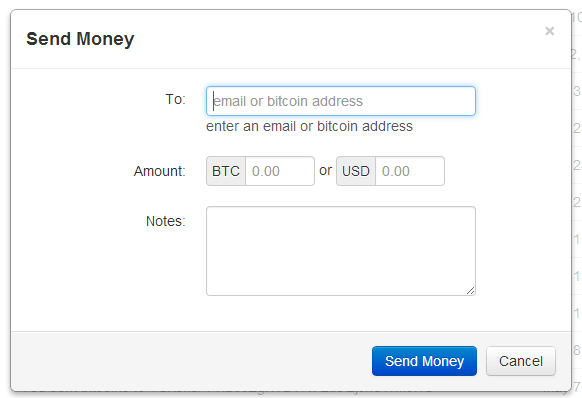
Coinbase is a web wallet with a simple design and a number of very useful features that make it excellent for beginners. You can send and receive bitcoins via email and buy and sell bitcoins directly from Coinbase.
Once you get the hang of things, it is better to move your coins off of Coinbase and into a wallet mentioned above like the Ledger Nano S . Coinbase is a good place to buy bitcoins and learn how it works, but not a good solution for long term storage.
A full-featured Android app enables access to all account functions on the go. Coinbase’s founders have a proven startup track record and have raised money from very prominent venture capitalists. This gives Coinbase a level of legitimacy unparalleled in the Bitcoin space. They are also one of the only large Bitcoin companies to never suffer a major hack. Click here to sign up.

Electrum is a software wallet that enables you to set up a strong level of security very quickly. During the simple installation process, you are given a twelve word phrase that will allow you to recover all of your bitcoins in the event that your computer fails. Your wallet is also encrypted by default which helps protect your coins against hackers. Electrum is available for Windows, OSX, and Linux and is our recommended software wallet for beginners. Click here to download the right version for your operating system.
Bitcoin Wallet for Android
For those looking for mobility and security, we recommend the simply-titled Bitcoin Wallet mobile app. There is a version for both Android and BlackBerry OS . It is a software wallet, so you retain complete control over your bitcoins. It also works well with QR codes and NFC, making transferring coins to someone else’s phone easier than writing a check. Be sure to backup your wallet (with the included “Backup Wallet” feature) or you risk losing all your coins the next time you get too close to a pool.
Other Wallets
We also recommend a few other wallets, but not for the beginning Bitcoin user. If you are up for more of a challenge, Armory is a good choice for those requiring the highest possible security, and the original Bitcoin-Qt client is also trusted and worth learning how to use.
Now that you have a wallet set up, it’s time to learn how to get some bitcoins .
Bitcoin Wallets Test: Die besten Bitcoin Wallets im Vergleich
Wir testen und vergleichen die besten Bitcoin-Wallets
Um Bitcoins zu senden, zu empfangen und zu sichern wird eine Bitcoin-Wallet benötigt. In der Bitcoin Wallet wird der Private Key (Private Schlüssel) gesichert, mit dem auf die eigenen Bitcoins zugegriffen werden kann. Das Angebot an Bitcoin-Wallets und die erweiterten Funktionen der Wallets sind mittlerweile riesig. Wir testen und vergleichen die besten Bitcoin Wallets.
Inhaltsverzeichnis
Die besten Bitcoin Wallets im Vergleich


- ✔ Akzeptiert PayPal


Unsere Empfehlung der Testsieger: Bitcoin Wallet Hardware: Ledger Nano S

Die Ledger Wallet ist eine hardwarebasierte Bitcoin Wallet. Hardware-Wallets gehören im Allgemeinen zu den sichersten Möglichkeiten die eigenen Bitcoins vor Hackerangriffen oder sonstigen unerwünschten Zugriffen zu schützen. Die Wallet ist eine sogenannte Cold-Wallet, erst wenn der Ledger Nano S per USB-Anschluss mit dem Computer verbunden wurde, ist ein Zugriff über das Internet möglich.
Die Ledger Wallet ist eine Hardware Wallet nicht nur für Bitcoin sondern auch für weitere Altcoins wie Ethereum, Dash, Ripple oder Litecoin. Dabei wird die Ledger Wallet aktuell in zwei verschiedenen Varianten angeboten: Die Ledger Blue für aktuell ca. 280 Euro und die Ledger Nano S für aktuell ca. 70 Euro.
Vorteile der Ledger Wallet
Durch einen Chip kryptographisch gesicherter Schlüssel
Bestätigung der Transaktion auf einem LED-Display
Unterstützung von Bitcoin, Ethereum und vielen Altcoin
Einfache Bedienung mit der Ledger-App bzw. der Ledger-Chrome-Erweiterung
Einfache Anbindung per USB-Anschluss
Kompatibel mit weiteren Wallets wie MyEtherWallet
Nachteile der Ledger Wallet
Die eigenen Interfaces für den Zugriff auf die Wallets sind nur mit dem Google Chrome-Browser kompatibel
Die Erweiterung auf weitere Altcoin-Wallets ist aufgrund des verfügbaren Speicherplatzes stark begrenzt
Für die Anschaffung fallen einmalig Kosten in Höhe von ca. 70 Euro für die Leger Nano S bzw. 280 Euro für die Ledger Blue an.
Aktuell hat Ledger aufgrund der extrem hohen Nachfrage eine Lieferzeit von mehreren Monaten
Unsere Empfehlung als Preis-Leistungs-Sieger: Coinbase-Wallet

Die Bitcoin Wallet Coinbase bietet eine extrem einfache und sichere Wallet für Bitcoin, Ethereum und Litecoin. Die intuitive Gestaltung, die hohen Sicherheitsstandards und einige nützliche Funktionen machen Coinbase zu einer der beliebtesten Online-Wallets weltweit.
Coinbase wurde 2012 in San Francisco gegründet und verzeichnet knapp 6 Millionen Benutzer mit über 12 Millionen Geldbörsen. Coinbase legt ebenfalls großen Wert auf Sicherheit. Neben einer SMS-Verifizierung bietet Coinbase ebenfalls eine 2-Faktor-Authentifizierung an. Somit ist das Konto vor ungewollten Zugriffen geschützt. Jedoch ist bei Coinbase zu beachten, dass die Wallet eine Hot-Wallet ist und somit nicht im Entferntesten an die Sicherheit einer hardwarebasierten Cold-Wallet herankommt.
Zudem bietet Coinbase auch die Möglichkeit zum Kauf von Bitcoins oder Ethereum über Kreditkarte oder Banküberweisung an. Beim Kauf per Kreditkarte werden die Bitcoins oder Ethereum sofort gutgeschrieben, es gelten jedoch höhere Limits und zusätzlich fällt eine Gebühr von 3,99% an. In unseren Tests per Kreditkarte hat alles reibungslos funktioniert und die Bitcoins oder das Ethereum waren sofort auf unserem Konto.
Vorteile der Coinbase-Wallet
Einsteigerfreundlich: Besonders für Bitcoin-Neulinge eine gute Wahl
Integrierte Kaufmöglichkeit von Bitcoin, Ethereum und Litecoin per Lastschrift oder Kreditkarte
Etablierte und vertrauenswürdige Firma aus San Francisco (USA)
Hohe Sicherheitsstandards mit beispielsweise 2-Faktor-Authentifizierung oder der Bitcoin-Tresor (Bitcoin Vault)
Extrem schnelle Überweisung zu angemessenen Transaktionsgebühren
Nachteile der Coinbase-Wallet
Die Kontrolle der eigenen Bitcoins wird an eine fremde Firma übergeben
Die Wallet ist eine Hot-Wallet und hat somit geringere Sicherheit wie eine hardwarebasierte Wallet
Bitcoin Konto: Wie funktionieren die Bitcoin Wallets?

Die Bitcoin Wallets sind zu vergleichen mit einem Geldbeutel in dem die eigenen Münzen, die Bitcoins, verwahrt werden bzw. mit einem Bankkonto. Um Bitcoins zu versenden hat die Wallet eine eigenen Zeichenfolge, den öffentlichen Schlüssel „Public Key“. Das bedeutet, dass die Bitcoins die an den Public Key gesendet werden an den Besitzer des zu dem Public Key dazugehörigen Private Key wechseln.
„Öffentliche Schlüssel (Public Key) = Wallet-Adresse, an die andere Bitcoins senden können.“
Und nun kommen wir zu dem zweiten, privaten Schüssel, dem „Private Key“. Dieser wird benötigt, um auf die Bitcoins zuzugreifen, die an den Public Key gesendet wurden. Somit ist derjenige, der den Private Key kennt auch der Besitzer der Bitcoins und kann diese wieder weiter ausgeben.
„Beim Senden von Bitcoins an einen Public Key übergebe ich das virtuelle Geld an denjenigen, der im Besitz des Private Key ist und somit der neue Besitzer der Bitcoins wird.“
Und genau diese Funktion übernimmen die Bitcoin Wallets. Diese enthält die Schlüssel, womit es möglich ist mit einer Wallet Bitcoins zu senden, zu empfangen und zu sichern. Grundsätzlich kann der Zugriff auf eine Bitcoin Wallet lediglich über den privaten Schlüssel erfolgen. Sobald dieser Zugangsschlüssel verloren geht, sind auch die darin aufbewahrten Bitcoins weg. Vergleichbar wäre dies mit dem Verlust der Geldbörse, welche Fiat-Geld (bspw. Euro oder US-Dollar) beinhaltet.
Worauf sollte man bei sicheren Bitcoin Wallets achten?
Hohe Sicherheit: Wie gut sind die Bitcoin geschützt. Handelt es sich um eine Hot- oder Cold-Wallet?
Backup & Sicherung: Wie kann man sich vor dem Verlust der Private Keys schützen und die Wallet wiederherstellen?
Privatsphäre: Schützt die Wallet die Privatsphäre bspw. durch Generierung von neuen Public Keys bei jedem Geldeingang?
Private Keys: Besteht die Möglichkeit auf die eigenen Private Keys zuzugreifen bzw. hat man diese unter eigener Kontrolle?
Einfachheit & Intuition: Wie einfach ist eine Wallet einzurichten und wie kann diese genutzt werden?
Weiterentwicklung der Wallet: Gibt es ein starkes Entwicklerteam bzw. eine solide Firma hinter der Wallet oder eine aktive Community, die die Wallet stetig weiterentwickelt und Sicherheitslücken direkt erkennt und behebt?
Kompatibilität: Ist die Wallet mit verschiedenen Betriebssystemen oder Devices (PC, Mac, Smartphone) kompatibel?
Sind Bitcoin Wallets anonym?
Grundsätzlich sind die Bitcoin Wallets anonym, was bedeutet, dass Bitcoin Wallets keine personalisierten Informationen wie Name oder Adresse des Besitzers speichern. Jedoch sind diese einer Person zugeordnet, nämlich der Person, die den Private Key der Wallet besitzt und damit die Kontrolle über die Bitcoins hat. Das bedeutet, dass Bitcoins häufig als pseudo-anonymes Zahlungsmittel angesehen wird. Denn die wahre Identität der Person ist nicht ersichtlich, jedoch kann jede Transaktion der Person über die Blockchain nachvollzogen werden. Die Bitcoin Adresse ist somit direkt mit einer Person verknüpft und wird als Pseudonym der Person verwendet.
„Jede Wallet ist anonym – es werden keine persönlichen Daten wie Name oder Adresse gespeichert.“
In der Blockchain wird jede Transaktion der Bitcoin Wallet festgehalten und ist auch für jeden ersichtlich. Somit kann von der ersten Überweisung bis hin zur letzten Transaktion alles in der Blockchain nachvollzogen werden.
Wann sind die Bitcoin Wallets nicht mehr anonym? Es gibt verschiedene Wege, wie die Anonymität der Bitcoin Wallets nicht mehr gegeben ist. Einige könnten sein:
- Eine Bitcoin-Wallet Adresse wird mit Namen veröffentlicht: „Spende bitte an meine Adresse: 123“
- Mit den Bitcoins wird eingekauft und die Empfängeradresse angegeben
- FIAT-Geld („Euro“, „US-Dollar“) werden gegen Bitcoins eingetauscht. Hier muss meist aufgrund verschiedener Geldwäsche-Gesetze die Identität angegeben werden
„Wenn jemand Ihre Wallet kennt, kann er auch einsehen, wie viel Guthaben Sie auf dieser haben.“
Häufig wird für jede eingehende Transaktion eine neue Adresse verwendet, so dass das Guthaben der eigenen Wallet nicht eingesehen werden kann. Obwohl das Guthaben jeder Wallet eingesehen werden kann, kann nur mit dem Private Key darauf zugegriffen werden.
Wie erstelle ich eine Bitcoin Wallet?
Das Erstellen einer Bitcoin Wallet ist mittlerweile sehr einfach und es gibt unzählige Anbieter für Bitcoin Wallets. Das Schwierigste ist, den Verwendungszweck der Wallet und den entsprechenden Anbieter auszuwählen.
Bitcoin Wallets erstellen
In wenigen Schritten zeigen wir, wie Bitcoin Wallets online eingerichtet werden kann und auch erste Bitcoins gegen Euro gekauft werden können:
Aktuell existieren fünf unterschiedliche Wallet Kategorien:
- Desktop-Wallet
- Mobile-Wallet
- Online- oder Web-Wallet
- Paper-Wallet
- Hardware-Wallet
Jede Kategorie hat bestimmte Vor- und Nachteile. Nehmen wir als Beispiel die Paper-Wallet. Eine eigene Bitcoin-Paper Wallet kann sich jeder in einer Minute erstellen (bspw. https://www.bitaddress.org/).

Diese hat den großen Vorteil, dass der Private Key ausgedruckt werden kann und der Zugriff durch Hacker somit beinahe unmöglich ist. Doch bringt die Paper Wallet natürlich auch Nachteile mit sich. Denn um auf die eigene Wallet zuzugreifen, um beispielsweise Bitcoins zu transferieren, muss jedes Mal der Public und Private Key eingegeben werden. Somit ist die Bitcoin-Paper-Wallet beispielsweise nicht als tägliches Girokonto geeignet, um mehrere Überweisungen zu tätigen – um Bitcoins auf längere Sicht zu sparen kann schon eher ein sinnvoller Anwendungszweck der Paper-Wallet sein.
Die Bitcoin Hardware-Wallet einrichten: Ledger Nano S

Die Ledger-Wallet* ist eine hardwarebasierte Bitcoin-, Ethereum- & Altcoin-Wallet. Hardware-Wallets gehören im Allgemeinen zu den sichersten Möglichkeiten die das eigene Ether vor Hackerangriffen oder sonstigen unerwünschten Zugriffen zu schützen. Die Wallet ist eine sogenannte Cold-Wallet, erst wenn der Ledger Nano S-Stick per USB-Anschluss mit dem Computer verbunden wurde, ist ein Zugriff über das Internet möglich.
Die Bitcoin Wallet ist in wenigen Schritten eingerichtet
Nachdem der Leder Nano S-Stick mit dem Computer per USB-Kabel verbunden wurde, wird man mit einer „Welcome“-Meldung begrüßt. Nach der kurzen Begrüßung kann der Ledger Nano S-Stick konfiguriert werden. Indem beide Tasten kurz gleichzeitig gedrückt werden kann mit der Konfiguration gestartet werden. Das kurze gleichzeitige drücken beider Tasten ist immer die Bestätigung einer Aktion.
Kurz beide Knöpfe gleichzeitig drücken = Bestätigung einer Aktion
Linken Knopf drücken = nach oben / nach links
Rechten Knopf drücken = nach unten / nach rechts
1. Schritt: Start der Konfiguration
Mit der Auswahl „Configure as new device?“ wird mit dem rechten Knopf die Konfiguration als neue Hardware-Wallet begonnen. Im Falle eines Verlustes oder einer Beschädigung eines alten Ledger-Sticks kann auch ein bereits erstellter Wiederherstellungs-Seed (Revovery Seed) einer anderen Wallet angegeben werden. Damit kann auf eine bereits vorhandene Wallet zugegriffen werden.
2. Schritt: Pin-Code vergeben

Damit die Ledger-Hardware-Wallet auch im Falle eines Verlustes vor unbefugtem Zugriff geschützt ist, wird ein Code vergeben. Dieser kann wahlweise zwischen 4-8 Stellen lang sein. Mit dem rechten oder linken Knopf wird dabei die Zahl ausgewählt. Hat man sich für eine Zahl entschieden wird diese mit dem drücken beider Knöpfe gleichzeitig eingerastet. Nach vier Stellen kann der Code im Ganzen bestätigt werden.
Unsere Empfehlung: Wird die Wallet sicher zu Hause gelagert, ist meist ein Code mit vier Stellen ausreichend – besonders wenn die Wallet häufiger genutzt wird, kann es auch lästig werden einen längeren Code einzugeben. Wer jedoch seine Hardware-Wallet mit auf Reisen mitnimmt oder dauerhaft bei sich trägt, der sollte zu einem sicheren längeren Code greifen.
Den Pin sollte man sich auf jeden Fall merken, da dieser bei jedem Start der Hardware-Wallet abgefragt wird!
3. Schritt: Backup mit Wiederherstellungs-Seed sichern
Falls die Ledger-Wallet einmal verloren geht oder defekt ist, ist die Wallet mit den darauf gesicherten Coins nicht verloren. Denn mit dem Recovery-Seed kann die Wallet wieder hergestellt werden. Dabei kann mit Hilfe des Seeds auf einer beliebigen anderen Ledger-Wallet, aber auch auf anderen Software- oder Online-Wallets die Private Keys, für den Zugriff auf die Wallet, wieder hergestellt werden. Dafür müssen 24 kurze Wörter auf das mitgelieferte Recovery-Seed-Blatt geschrieben werden.
Achtung: Der Revovery-Seed ist extrem wichtig und sensibel: Hiermit kann die Wallet wiederhergestellt werden – aber auch Unbefugte, die den Recovery-Seed besitzen, können damit den Private Key wiederherstellen und so Zugriff auf die Wallet erlangen. Deswegen sollte der Seed unbedingt sicher aufbewahrt werden!
Nachdem die 24 Wörter abgeschrieben wurden, werden von dem Stick sicherheitshalber nochmal zwei Wörter abgefragt. Wurden diese richtig eingegeben, so ist der Stick fertig konfiguriert und kann verwendet werden.
4. Schritt: Bitcoin Chrome App installieren
Herzlichen Glückwunsch! Dein Stick ist nun fertig eingerichtet. Nun kannst du die dazugehörigen Interfaces für den PC installieren, um auf die Wallets zuzugreifen, Coins zu empfangen und zu senden.

Dabei sind diese Wallet-Interfaces kleine Apps, die zusammen mit dem Chrome-Browser funktionieren. Diese können hier für verschiedene Wahrungen heruntergeladen werden: https://www.ledgerwallet.com/apps

Nach dem Starten der App kann der Ledger-Stick angeschaltet und die entsprechende Wallet ausgewählt werden. Dabei sind von Anfang an zwei Standard-Wallets für Bitcoin und Ethereum vorinstalliert – auf dem Stick können per Update noch weitere Wallets nachinstalliert werden.

Nach dem Öffnen der Bitcoin Wallet auf dem Ledger-Stick steht die Chrome-App vollständig zur Verfügung und es können Bitcoin empfangen und gesendet werden.
Bitcoin wallet empfehlung
The reason i asked this question, because i just discover bitcoin a day back. And i found out that there are 3 type of wallet, which is in web like coinbase, our own computer like multibit, and mobile wallet.
Seems like those 3 have flaw. I just imagine, if my computer got crashed or the website closed; will that mean i lost all the entire bitcoin. Is there any other method to keep bitcoin in the safest place on earth?
Sorry if this sound too noob. Thanks for answering.
The answer from Anton A. is pretty good; I'm adding this as additional information.
Offline wallets are stored on a computer that never connects to the network so they can only be hacked by being physically present. Additional security can be added by encrypting the Bitcoin wallet or the computer as a whole (be aware on the later that the encrypted computer is only secure once it has been completely shut down for several minutes).
The way it works with Armory is that you have an online copy with the public key where you can see your balance. To create a transaction you do it on the online wallet, copy it to a USB stick, connect it to the offline computer and sign it there, then once you load the signed transaction on the online wallet it gets sent to the Bitcoin network for inclusion in blocks.
The paper backup is needed to recover your Bitcoin in case you lose your offline wallet or password (failure, fire, etc.). I recommend storing it in a bank safe if it holds any substantial value.
Another type of wallet that provides a new, handier way of storing Bitcoin safely is called a Hardware wallet. Hardware wallets are a small piece of hardware which store your private key securely and only allow signing transaction, in some case with an address confirmation display and PIN. Just like offline wallets, hardware wallets allow you to save a paper copy of your key in case you lose or break the device.
These devices are safe to use even on a compromised computer provided that you can verify the transaction output addresses before letting the device sign it, and a PIN may protect the device from theft. There are multiple different implementations with varying levels of security. Some of these wallets have additional features such as providing 2-factor authentication.
Offline wallets are probably still the best way to store large amounts securely, accompanied with either a mobile or hardware wallet for day-to-day Bitcoin transactions.
Best Ethereum Wallet (2018 Update) – 5 Options Reviewed
Last updated on February 26th, 2018 at 04:29 pm
Ethereum, the blockchain platform that allows smart contracts, is becoming more and more popular. Since the beginning of 2017 the price has spiked from $8.22 to around $50. I’ve covered how to buy Ethereum in a previous post but that’s only part of the process. Today I want to cover 5 different types of Ethereum wallets so you will know where to store your Ethereum.
Ethereum is a very technical currency (even more than Bitcoin), therefore most wallets out there aren’t newbie friendly. I will go over them from the simplest to the most complex so you can choose the one that is best suited to your knowledge level.
Hardware wallets – Best security (for a price)
If you’re serious about securing your altcoins I suggest storing your Ethereum on a hardware wallet. However these hardware wallets aren’t free and cost anywhere between $50-$100 (shipping not included). Today’s leading hardware wallets TREZOR, Ledger and KeepKey all supply you with the option to store Ethereum on them. Instead of explaining about each one I’ll just link to my previous reviews on the wallets:
Personally, I use a TREZOR but all three are excellent choices for maximum security.
Coinbase’s Ethereum wallet – The simplest option
Coinbase supplies an Ethereum wallet as well as a Bitcoin wallet. Coinbase’s wallet is simple to set up and very easy to use, however it has a few limitations you’ll need to be aware of:
- The company holds the private key of the wallet for you. This means you’re not in control of your funds and Coinbase can decide to shut down your account if they want to. There were cases in the past that Coinbase shut down user accounts do to illegal activity.
- The Coinbase ETH wallet doesn’t support ETC (Ethereum Classic). For a simple explanation about ETC vs ETH read this post.
Once you open a Coinbase account you’ll immediately see an ETH wallet appearing under the “accounts” tab.
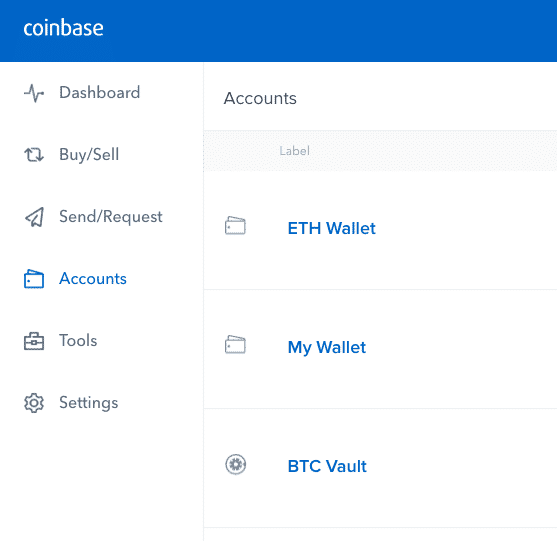
You can then enter your ETH account and click on “wallet address” in order to get your Ethereum public address.
Click here to check out Coinabase’s ethereum wallet.
Exodus wallet – The desktop option for increased control
Exodus is a Bitcoin and Altcoin desktop wallet with beautiful design and an intuitive interface. I’ve reviewed the wallet in the past and thought it was one of the best I’ve found so far. When it comes to limitations for exodus keep in mind that it’s not 100% open source. Many components inside Exodus are open source, but not all of them. This means that the code doesn’t get reviewed in full by the community.
Also the wallet is currently available only in a desktop version (no mobile version yet). Like Coinbase, Exodus does not support ETC only ETH. However, unlike Coinbase, Exodus is an independent wallet that stores the private key on your machine and not on any external sever. This means you have full control (and full responsibility) for your coins.
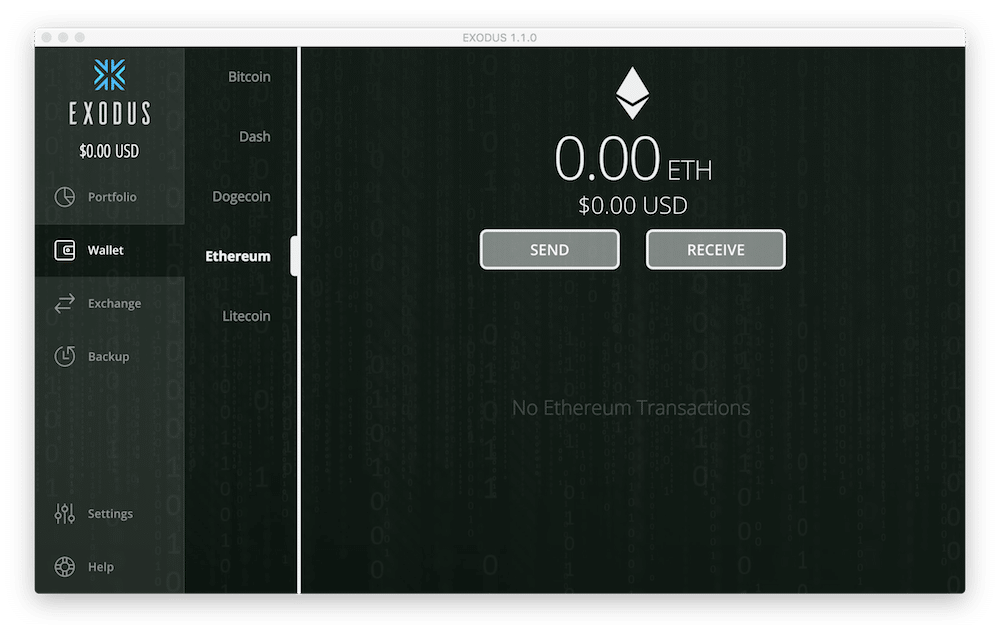
Exodus allows you to accept Bitcoin, Ethereum, Dash, Dogecoin and Litecoin. Just go to “Wallet” and choose the cryptocurrency you want. Afterward click on “Receive” to view your Ethereum address.
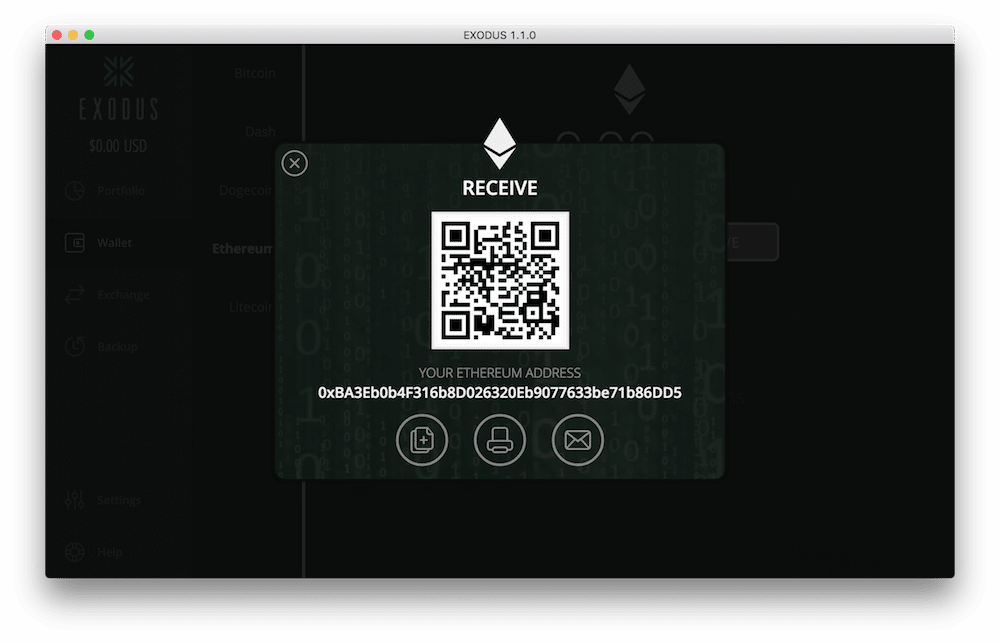
Click here to view Exodus for yourself.
Jaxx Wallet – The new kid on the block
While I haven’t fully reviewed Jaxx yet (I plan to do so next week), from my first impression it seems to be a very good Bitcoin and Altcoin wallet for all your devices (desktop and mobile). Similar to Exodus Jaxx provides a simple and intuitive interface for many altcoins.
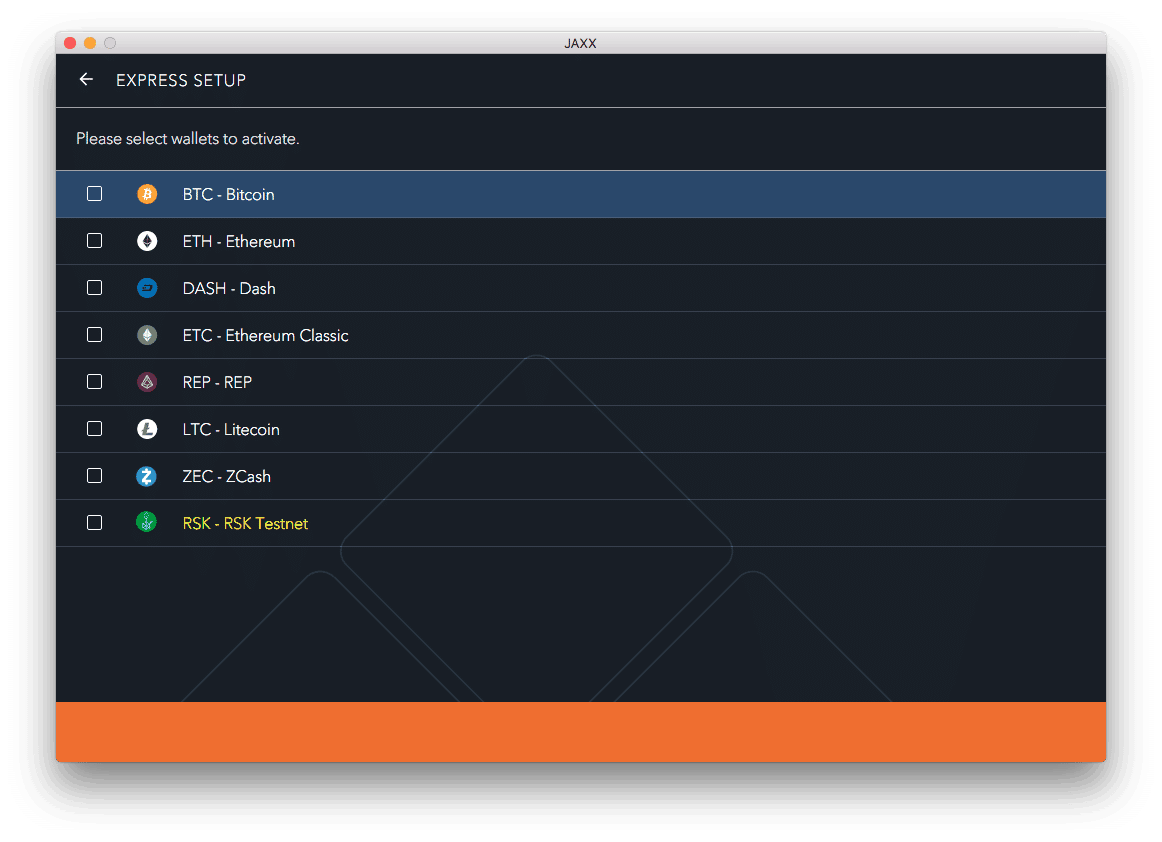
Unlike most other wallets out there Jaxx supports ETH and ETC. Also, your private keys are never shared with Jaxx’s server and are safely stored on your machine. Jaxx is not open source but the code is freely available on the wallet’s website which makes it a bit more accessible for review.
In order to receive Ethereum with Jaxx just make sure you have that currency set up when you first install the program. Then choose the currency on the top bar and you will see your Ethereum address right below.
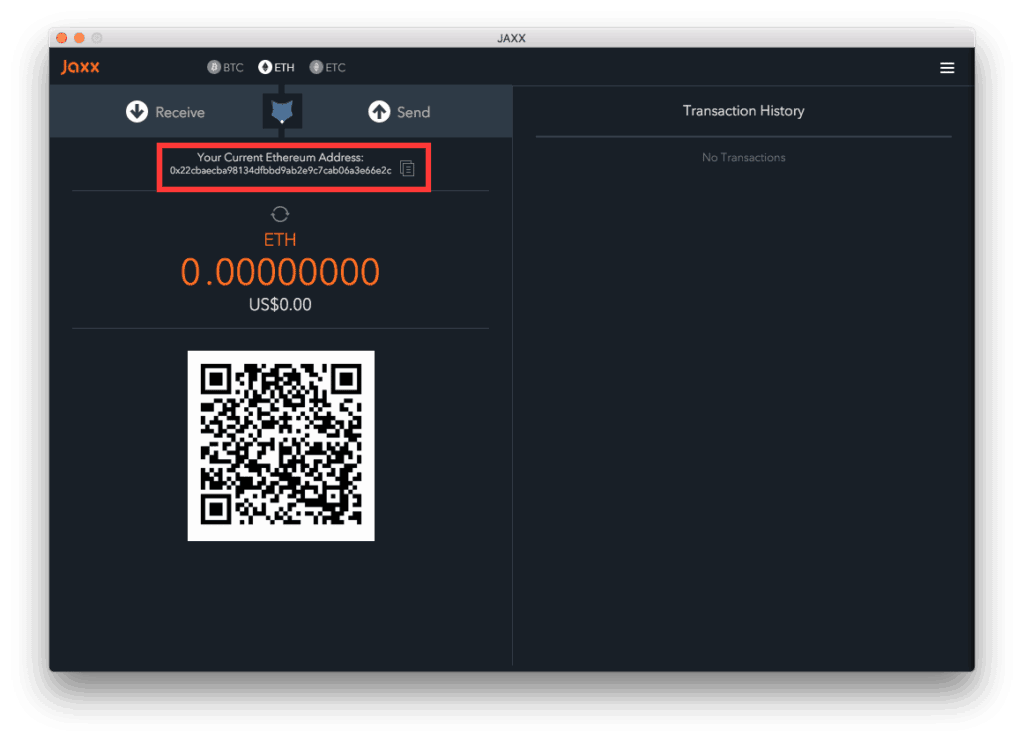
Click here to check out Jaxx for yourself
ETHAdress – The cold storage option
For those of you who wish to store Ethereum offline you can print out an Ethereum Paper wallet. ETHAdress is an open source project that will create Ethereum paper wallets for you. Similar to BitAddress.org, the site will create a private and public key pair with the click of a button. You can then print out this information and store it in a safe place so no external hacker will be able to get your coins.
One more option that’s available is to encrypt your private key so that if you or anyone else wants to use the coins they will need to know the password to decrypt it.

You should NEVER share your private key with anyone. In the image above my private key is publicly exposed but it’s because there are no coins in this wallet. The minute someone knows your private key he has control over your coins.
Using ETHaddress will probably be a relatively secure way of storing Ethereum. However, ETHaddress can be used only with ETH (not ETC). Also, if you ever want to send your coins to someone else you will need to import the keys into an online wallet (e.g. Exodus, Jaxx) and only then you will be able to use them.
Click here to visit ETHAddress.
MyEtherWallet – A web interface for Ethereum
MyEtherWallet is a website that allows you to create, send and receive Ethereum without it having any control over your private keys. When you first enter the site you can choose if you want to generate a wallet, send Ethereum or a variety of other options.
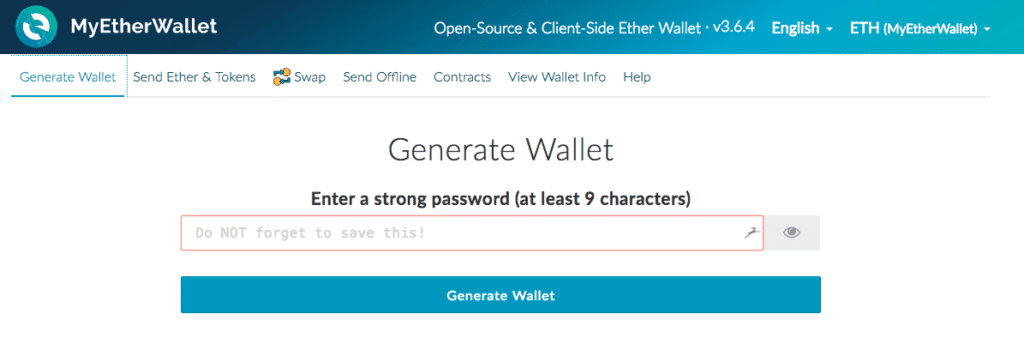
If you generate a wallet the site will create a public-private key pair which will be protected by a password of your choosing. You will then get a downloadable file with that key pair for future use. Whenever you will want to send Ethereum from this file you will need to upload it to the site and supply the password.
Sending can be done via the website itself or through other wallets such as TREZOR or Ledger. The site’s code is open source and it only works with ETH.
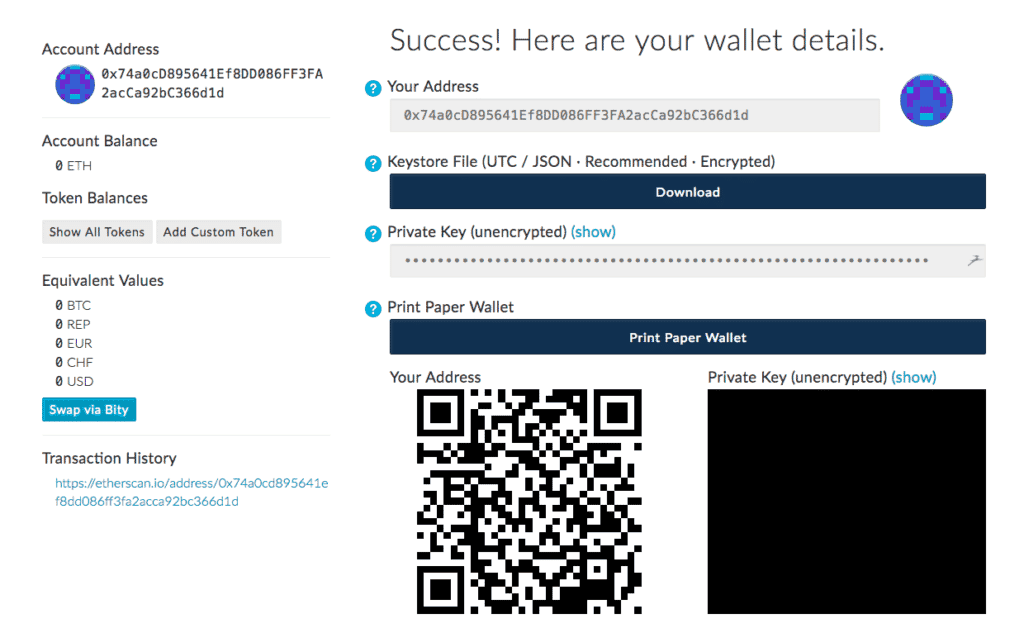
Click here to visit MyEtherWallet.
Ethereum wallets are still in their early days
Even though Ethereum has been around for a few years, as you can see from the variety above it’s not as popular as Bitcoin (yet). However, since Ethereum’s price is on the rise lately I guess we will be seeing more Ethereum wallets and exchange support for this currency soon.
At the time of writing there are also several exchanges that support Ethereum (e.g. BitPanda, Cex.io and more) however I don’t think it’s a good option to use them as wallets, that’s why I didn’t cover them in this post.
If you’ve had any experience with the wallets above or any other Ethereum wallet not mentioned here I’d love to hear about it in the comment section below.
14 Best Bitcoin Wallets For Secure Bitcoin Storage
Here’s something every bitcoin owner should know: the safety and security of your bitcoins is ultimately your responsibility.
Combining digital security knowledge as well as secure bitcoin storage is important if you don’t want your accounts hacked and bitcoins drained. Remember – bitcoin transactions are not reversible. To send or spend bitcoins, one must have access to both public and private keys. Private keys, especially, must be protected.
Types of Bitcoin Wallets
There are a few types of bitcoin wallets and they have varying security mechanism to ensure the safety of private keys.
Simplistically, bitcoin wallets can be divided into 5 types: desktop, mobile, online, hardware and paper wallets. Some types may overlap or used in combination with each other. I’m going to touch on what to expect from each type and feature a few examples you can try out.
Here are 14 secure bitcoin wallet options you can choose from.
Desktop wallet
- Bitcoin desktop wallets offer one of the highest (if not the highest) level of security in terms of bitcoin storage.
- You must download the software to your computer and perform bitcoin transactions from desktops, so it may not be practical for some people.
- This option can be technical and confusing for bitcoin newbies.
Bitcoin Core
Bitcoin Core is the first and original wallet. Using this option means having control over both your public and private keys, which ensures safe storage.
However, Bitcoin Core also requires a lot of space as the software comes with data on every bitcoin transaction ever performed.
According to the download page, as of 2016 you need 65GB of free space – this number will increase as more bitcoin transactions happen every day.
Just over 30MBs, Multibit is a lightweight desktop bitcoin wallet.

Many people use it together with KeepKey (more about this below), a USB device that requires your manual confirmation before any bitcoins can be transacted.
Calling themselves ‘The Only Open-Source Wallet With Cold Storage and Multi-Signature Support’, Armory is one of the popular options around for desktop bitcoin wallet.

Private keys are stored in an offline computer, which means that only someone with access to the physical location of the computer (it is kept secret) can steal bitcoins.
Mobile Wallets
- Bitcoin mobile wallets are not only accessible and practical
- Many also incorporate other layers of security to ensure users’ bitcoins are not compromised.
- It is a good idea to keep only a small amount of bitcoins in mobile wallets while keeping the rest in more secure options.
Note: All the recommendations below are available for both Android and iOS users.
Mycelium is one of the safest and most recommended options for secure bitcoin storage on mobile. Boasting ‘bank grade security’, it boasts Hierarchical Deterministic wallets, private key deletion and ‘watch only’ accounts.

This full-fledged bitcoin service provider offers both online and mobile secure bitcoin wallets. What differentiates Wirex from the rest is its ease of use while not compromising security.

Users get multi-signature (‘multi-sig’) wallets and can enable 2-factor authentication (2FA) for both app and Wirex-link email address, making third-party breaches hard.
Famous for its vault and security, Xapo combines cold storage and multi-sig technology to keep users’ bitcoins safe. Its servers are kept ‘behind reinforced concrete walls, a steel blast door and radio wave-blocking Faraday cage’, located ‘within the Alps’.

Online wallets
- Online bitcoin wallets are wallets that are easily accessibly on the Web via any device so long as it can be connected to the Internet.
- It is easier and faster to make transactions via online wallets due to its accessibility.
- Phishing, malware, insider hacking or plain lack of digital security knowledge makes it easy for hackers to steal bitcoins from online wallets.
- The failure of two huge bitcoin exchanges (Mt Gox and Bitfinex) make people wary of such services.
Although the bitcoin wallets recommended in this section have high reputation, we suggest you keep larger amounts of bitcoins in other types of wallets.
Blockchain.info
Blockchain.info is the most popular (8 mil wallets) website everyone uses to perform and check bitcoin transactions. They are often praised for its ease of use, multi-country support, and cross-platform capability.

Aside from web wallet, Blockchain.info is also available on desktop and mobile app.
A respected name in the Bitcoin world, BitGo is considered a leader in blockchain security. BitGo is great for individuals and businesses who prefer near-instant transactions. Usually, a bitcoin transaction needs between 3-6 confirmations, taking about 30-60 minutes.

With BitGo Instant and its zero-confirmation technology, users can make both secure and fast transactions.
GreenAddress
Many bitcoin holders have the tendency to check bitcoin wallets multiple times to reassure themselves their bitcoins are still there. This constant login-logout might be unsafe if it was done over unsecured WiFi or exposed to malware or phishing tactics.

GreenAddress’s watch-only mode helps users to check balances without compromising safety. Hierarchical Deterministic wallets also help to keep users’ bitcoins secure.
Hardware Wallet
- The method of choice for many bitcoin holders to keep significant quantities of bitcoins
- Hardware bitcoin wallets are user-friendly and portable.
- All of these Plug-and-Play options give users complete control of their own bitcoins.
One of the biggest fears of a bitcoin holder is unknown transaction that depletes all of their bitcoin savings. KeepKey helps to alleviate this fear. Users will have to approve each outgoing transaction on the KeepKey device, manually.

Private keys remain in the device, which is also PIN-protected in case it falls into the wrong hands.
A trusted name and endorsed by many key Bitcoin community leaders, Trezor is small and simple to use. It features security against malware and disaster recovery in case of theft or loss.

Ledger Nano
The smallest and most cost-effective option, the USD-sized Ledger Nano comes in a few variations. Everyday users can select between Ledger Nano or Ledger Nano S. The latter is the first hardware wallet that can also store Ether (ETH/ETH), making it the first of its kind.

Paper Wallet
- Bitcoin paper wallets are safe against hackers as the bitcoins are brought offline.
- Users have control of their bitcoins at all times as they keep own private keys.
- The problem, however, is storage. Paper can be destroyed, torn, fade or otherwise lost.
- Unlike hardware wallets, there is no recovery mechanism for paper wallets – so lost bitcoins are lost forever. This is something you need to keep in mind if you want to use this option.
BitcoinPaperWallet
Users can print tamper-resistant paper wallets with this services to keep their bitcoins offline. Offering additional security tips, designs and supplies, this website is a favorite among bitcoin cold storage advocates. It even has a handy video showing you how to use this paper wallet.
BitAddress
BitAddress.org is a no-frills free service that can generate bitcoin paper wallets easily.
Conclusion
To a new bitcoin user, this information might seem daunting. You might have heard of bitcoin losses due to hacks, malware, or perhaps simply human error.
We suggest keeping most of your bitcoins in either paper or hardware wallets (or if you have the space, in Bitcoin Core). If you must keep bitcoins in online or mobile wallets, spread them around in a few reputable websites as recommended above.
US Search Mobile Web

Welcome to the Yahoo Search forum! We’d love to hear your ideas on how to improve Yahoo Search.
The Yahoo product feedback forum now requires a valid Yahoo ID and password to participate.
You are now required to sign-in using your Yahoo email account in order to provide us with feedback and to submit votes and comments to existing ideas. If you do not have a Yahoo ID or the password to your Yahoo ID, please sign-up for a new account.
If you have a valid Yahoo ID and password, follow these steps if you would like to remove your posts, comments, votes, and/or profile from the Yahoo product feedback forum.
- Vote for an existing idea ( )
- or
- Post a new idea…
- Hot ideas
- Top ideas
- New ideas
- Category
- Status
- My feedback
Improve your services
Your search engine does not find any satisfactory results for searches. It is too weak. Also, the server of bing is often off
I created a yahoo/email account long ago but I lost access to it; can y'all delete all my yahoo/yahoo account except for my newest YaAccount
I want all my lost access yahoo account 'delete'; Requesting supporter for these old account deletion; 'except' my Newest yahoo account this Account don't delete! Because I don't want it interfering my online 'gamble' /games/business/data/ Activity , because the computer/security program might 'scure' my Information and detect theres other account; then secure online activities/ business securing from my suspicion because of my other account existing will make the security program be 'Suspicious' until I'm 'secure'; and if I'm gambling online 'Depositing' then I need those account 'delete' because the insecurity 'Suspicioun' will program the casino game 'Programs' securities' to be 'secure' then it'll be 'unfair' gaming and I'll lose because of the insecurity can be a 'Excuse'. Hope y'all understand my explanation!
I want all my lost access yahoo account 'delete'; Requesting supporter for these old account deletion; 'except' my Newest yahoo account this Account don't delete! Because I don't want it interfering my online 'gamble' /games/business/data/ Activity , because the computer/security program might 'scure' my Information and detect theres other account; then secure online activities/ business securing from my suspicion because of my other account existing will make the security program be 'Suspicious' until I'm 'secure'; and if I'm gambling online 'Depositing' then I need those account 'delete' because the insecurity 'Suspicioun' will program the casino game 'Programs' securities' to be… more
chithidio@Yahoo.com
i dont know what happened but i can not search anything.
Golf handicap tracker, why can't I get to it?
Why do I get redirected on pc and mobile device?
Rahyaftco@yahoo.com
RYAN RAHSAD BELL literally means
Question on a link
In the search for Anaïs Nin, one of the first few links shows a picture of a man. Why? Since Nin is a woman, I can’t figure out why. Can you show some reason for this? Who is he? If you click on the picture a group of pictures of Nin and no mention of that man. Is it an error?
Repair the Yahoo Search App.
Yahoo Search App from the Google Play Store on my Samsung Galaxy S8+ phone stopped working on May 18, 2018.
I went to the Yahoo Troubleshooting page but the article that said to do a certain 8 steps to fix the problem with Yahoo Services not working and how to fix the problem. Of course they didn't work.
I contacted Samsung thru their Samsung Tutor app on my phone. I gave their Technican access to my phone to see if there was a problem with my phone that stopped the Yahoo Search App from working. He went to Yahoo and I signed in so he could try to fix the Yahoo Search App not working. He also used another phone, installed the app from the Google Play Store to see if the app would do any kind of search thru the app. The Yahoo Search App just wasn't working.
I also had At&t try to help me because I have UVERSE for my internet service. My internet was working perfectly. Their Technical Support team member checked the Yahoo Search App and it wouldn't work for him either.
We can go to www.yahoo.com and search for any topic or website. It's just the Yahoo Search App that won't allow anyone to do web searches at all.
I let Google know that the Yahoo Search App installed from their Google Play Store had completely stopped working on May 18, 2018.
I told them that Yahoo has made sure that their Yahoo members can't contact them about anything.
I noticed that right after I accepted the agreement that said Oath had joined with Verizon I started having the problem with the Yahoo Search App.
No matter what I search for or website thru the Yahoo Search App it says the following after I searched for
www.att.com.
WEBPAGE NOT AVAILABLE
This webpage at gttp://r.search.yahoo.com/_ylt=A0geJGq8BbkrgALEMMITE5jylu=X3oDMTEzcTjdWsyBGNvbG8DYmyxBHBvcwMxBHZ0aWQDTkFQUEMwxzEEc2VjA3NylRo=10/Ru=https%3a%2f%2fwww.att.att.com%2f/Rk=2/Es=plkGNRAB61_XKqFjTEN7J8cXA-
could not be loaded because:
net::ERR_CLEARTEXT_NOT_PERMITTED
I tried to search for things like www.homedepot.com. The same thing happened. It would say WEBPAGE NOT AVAILABLE. The only thing that changed were all the upper and lower case letters, numbers and symbols.
Then it would again say
could not be loaded because:
net::ERR_CLEARTEXT_NOT_PERMITTED
This is the same thing that happened when Samsung and At&t tried to do any kind of searches thru the Yahoo Search App.
Yahoo needs to fix the problem with their app.
Yahoo Search App from the Google Play Store on my Samsung Galaxy S8+ phone stopped working on May 18, 2018.
I went to the Yahoo Troubleshooting page but the article that said to do a certain 8 steps to fix the problem with Yahoo Services not working and how to fix the problem. Of course they didn't work.
I contacted Samsung thru their Samsung Tutor app on my phone. I gave their Technican access to my phone to see if there was a problem with my phone that stopped the Yahoo Search App from working. He went to Yahoo and… more
Get an Ethereum Wallet
Ethereum is still quite new and has a smaller userbase than Bitcoin. The best Ether exchange is Kraken because it has the best reputation and volume in the Bitcoin/Ether, USD/Ether and EUR/Ether pairs. Ether wallet options are somewhat limited, although its passionate user base has already created a few decent wallet options.
Ethereum Wallet
Ethereum Wallet is a desktop Ethereum wallet. Ethereum Wallet has integrated with ShapeShift, which makes it easy to accept Bitcoin and other altcoin payments directly to your Ethereum Wallet as ether.

Geth is a command line interface for using, sending, receiving, and creating contracts with Ethereum. Geth is a good option for programmers, but not a good option for users in search of an easy-to-use wallet.
 Etherwall
Etherwall
Install Etherwall with Geth to transact directly with the Ethereum network through Geth, but with an easy to use interface provided by Etherwall.
 MyEtherWallet
MyEtherWallet
MyEtherWallet is an open source Javascript client-side Ether wallet. MyEtherWallet makes it easy to create secure wallets without the command line or the need to run an Ethereum client on your computer. By running MyEtherWallet on an offline computer, you can create secure paper wallets for your ether holdings.
MyEtherWallet also has a Chrome extension in beta that adds a better user interface for sending and receiving transactions.

EthereumWallet
EthereumWallet is an ether wallet by Kryptokit. Much like Kryptokit's RushWallet or MyEtherWallet, EthereumWallet uses client side Javascript to quickly create Ethereum addresses in web browsers. EthereumWallet is still in beta and should not be used to store large amounts of ether.
EthAddress
EthAddress is another open source Javascript client-side Ether wallet. It supports single wallets, bulk wallets, brain wallets, vanity wallets, and split wallets.
Bitcoins kaufen & handeln
Es gibt kaum eine Währung, die in den vergangenen Monaten so schnell an Wert gewonnen hat wie Bitcoins. Aufgrund der starken Kursschwankungen, sind Bitcoins bei Online-Käufern sehr beliebt. Im Folgenden zeigen wir, wie Sie den richtigen Bitcoin-Anbieter finden.
- Testberichte – Vor- und Nachteile der Anbieter
- Vergleich – Vergleich wichtiger Kriterien
- Erfahrungsberichte – Die wichtigsten Informationen
 Bei nachfolgenden Anbietern wird keine Wallet benötigt.
Bei nachfolgenden Anbietern wird keine Wallet benötigt.
Es gibt kaum eine Währung, die in den vergangenen Monaten so schnell an Wert gewonnen hat wie Bitcoins. Aufgrund der starken Kursschwankungen, sind Bitcoins bei Online-Käufern sehr beliebt. Im Folgenden zeigen wir, wie Sie den richtigen Bitcoin-Anbieter finden.
 Bei nachfolgenden Anbietern wird keine Wallet benötigt.
Bei nachfolgenden Anbietern wird keine Wallet benötigt.
Empfehlung des Monats

- Bitcoin, Ethereum, Ripple, Dash und Litecoin handeln
- Sehr übersichtlich
- Niedrige Gebühren
- Seriöser Anbieter
- Mobile App
- Mindesteinlage von nur 100€
- Keine Wallet benötigt
- Offizieller Sponsor – Juventus Turin
Die besten Anbieter für Bitcoins
- Bitcoin, Ethereum, Ripple, Dash und Litecoin handeln
- Sehr übersichtlich
- Niedrige Gebühren
- Seriöser Anbieter
- Mobile App
- Mindesteinlage von nur 100€
- Keine Wallet benötigt
- Offizieller Sponsor – Juventus Turin
- Bitcoin, Ethereum, Ripple, Dash und Litecoin handeln
- Sehr übersichtlich
- Niedrige Gebühren
- Seriöser Anbieter
- Mobile App
- Mindesteinlage von nur 100€
- Keine Wallet benötigt
- Offizieller Sponsor – Juventus Turin
- Etablierter & seriöser Anbieter
- Handle EOS, Stellar, Bitcoins, Litecoin, Ethereum, Ripple und Dash
- Cryptowährungen handeln
- Niedrige Gebühren
- Mobile App
- Möglichkeit in Krypto-Fonds zu investieren
- Etablierter & seriöser Anbieter
- Handle EOS, Stellar, Bitcoins, Litecoin, Ethereum, Ripple und Dash
- Cryptowährungen handeln
- Niedrige Gebühren
- Mobile App
- Möglichkeit in Krypto-Fonds zu investieren
- Seriöser Anbieter
- Viele Einzahlungsmöglichkeiten
- Benutzerfreundliche Plattform
- Demokonto
- Mobile App vorhanden
- Bitcoin, Litecoin und Ethereum handeln
- Seriöser Anbieter
- Viele Einzahlungsmöglichkeiten
- Benutzerfreundliche Plattform
- Demokonto
- Mobile App vorhanden
- Bitcoin, Litecoin und Ethereum handeln
- Regulierter & seriöser Anbieter
- Bitcoins, Ethereum, Litecoin und Ripple
- Cryptowährungen handeln
- Niedrige Gebühren
- Mobile App
- Bereits ab 10€
- Regulierter & seriöser Anbieter
- Bitcoins, Ethereum, Litecoin und Ripple
- Cryptowährungen handeln
- Niedrige Gebühren
- Mobile App
- Bereits ab 10€
- Große Auswahl an Cryptowährungen
- Große Auswahl an Cryptowährungen













Kryptowährungen können in den Preisen stark schwanken und sind nicht für alle Anleger geeignet. Der Handel mit Kryptowährungen unterliegt keinem EU-Regulierungsrahmen.
Ihr Kapital ist gefährdet.
Aufbewahrung & Wallets
Oft gestellte Frage: Bei den vorgestellten Broker werden können Sie von steigenden Kursen von Kryptowährungen profitieren. Hierfür werden keine Wallets benötigt.
Tipp: Beim Krypto-Trading werden keine Wallets benötigt.
Kauf von Bitcoins und Krypto-Währungen
So einfach können Bitcoins und Kryptowährungen gehandelt werden:
- Konto bei einem der oben genanten Anbieter eröffnen
- Geld auf das eröffnete Konto einzahlen. (z.B. per Überweisung, Kreditkarte oder PayPal)
- Gewünschte Währung kaufen (z.B. Bitcoin, Ethereum, Ripple, Litecoin oder Dash)
- Nach beliebiger Zeit Währung verkaufen
- Guthaben auf privates Konto ausbezahlen lassen
Tipp: In 5 Schritten kann mit Bitcoins und Kryptowährungen gehandelt werden.

Richtigen Bitcoin Anbieter finden
Mittlerweile haben sich eine Vielzahl von Bitcoin-Brokern auf dem Markt etabliert. Dabei ist es für Laien schwer den Überblick zu behalten. Der richtige Broker kann einfach gefunden werden, wenn folgende Kriterien beachtet werden:
Regulierung
In Europa gibt es Regulierungsbehörden, wie z.B. die Financial Conduct Authority (FCA) oder die Cyprus Securities and Exchange Commission (CySec). Sie stellen sicher, dass die Anbieter seriös arbeiten und das Geld der Käufer gesichert ist.
Tipp: Eröffnen Sie ihr Konto bei einem regulierten Anbieter!
Kundenservice
Auch wenn der Kundenservice selten benötigt wird, sollten unerfahrene Käufer darauf achten, dass der Anbieter einen deutschsprachigen 24-Stunden Support anbietet. Dieser kann im Falle von Fragen oder Problemen schnell und unkompliziert helfen. Viele Broker bieten neben einem telefonischen auch einen Live-Chat Support.
Tipp: Achten Sie auf die Support Sprache
Handelbare Werte
Einige Händler konzentrieren sich zu 100% auf das Kaufen von Bitcoins. Viele Käufer handeln jedoch auch Aktien, Währungspaare und Rohstoffe. Möchten Sie neben Bitcoins auch andere Werte handeln, sollten Sie einen Anbieter wählen, der die gewünschten Werte verfügbar macht.
Tipp: Wählen Sie einen Anbieter mit vielen handelbaren Werten!
Bitcoin wallet empfehlung
Still have a question? Ask your own!

There are several great Dash wallets but here is my top 5:
- Jaxx by Decentral[1] (Available on all platforms excluding hardware)
- Electrum Dash[2] (Light wallet that, supports Trezor + KeepKey)
- Official Dash Wallet[3] (Dash Core - Client, desktop only)
- Dash Wallet for Android by Hash Engineering[4]
- Coinomi[5] another Android Wallet
There are a couple, here is a review by The Dash Times (How To Store Your Dash) which recommends all the best including these and a few more.

There are lot of Dash Wallets.
Official Dash wallet page (from Dash Team) -> Dash Wallets
using above links u can have your own wallet, that application support for Windows, Linux, Mac.
SlithEx Dash Wallet (sponsored by Official Dash core Team)
SlithEx also facilitate to buy Dash using MYR (Malaysian Ringgit), IDR, SGD.
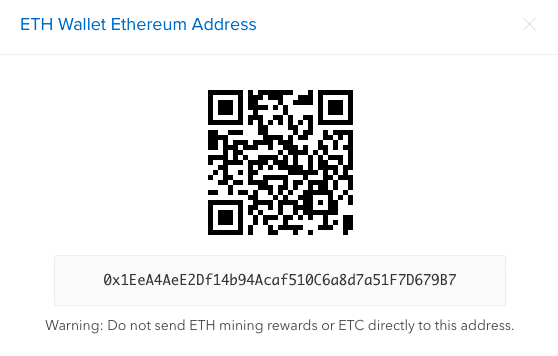
Комментариев нет:
Отправить комментарий